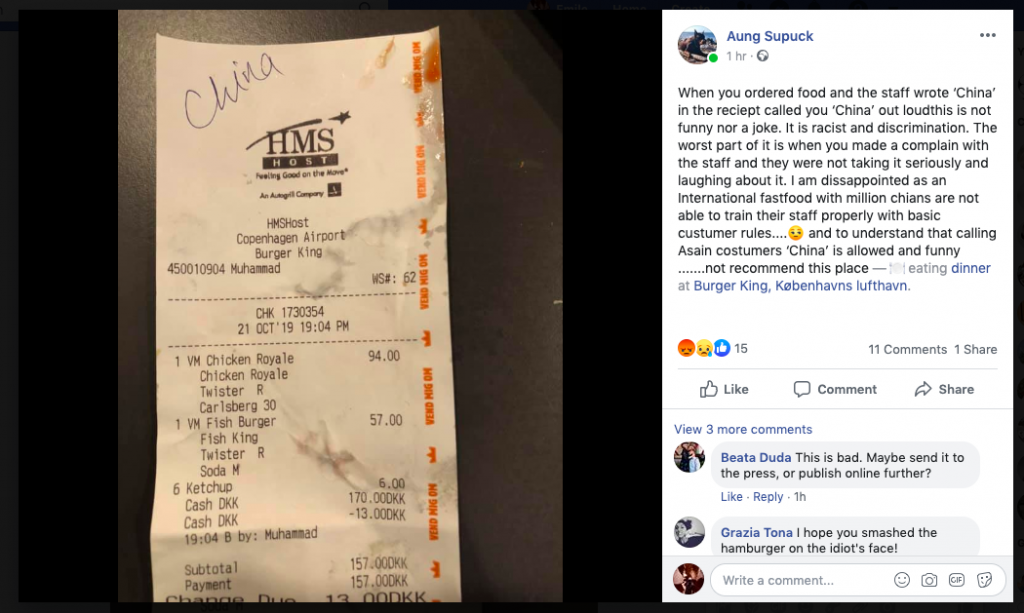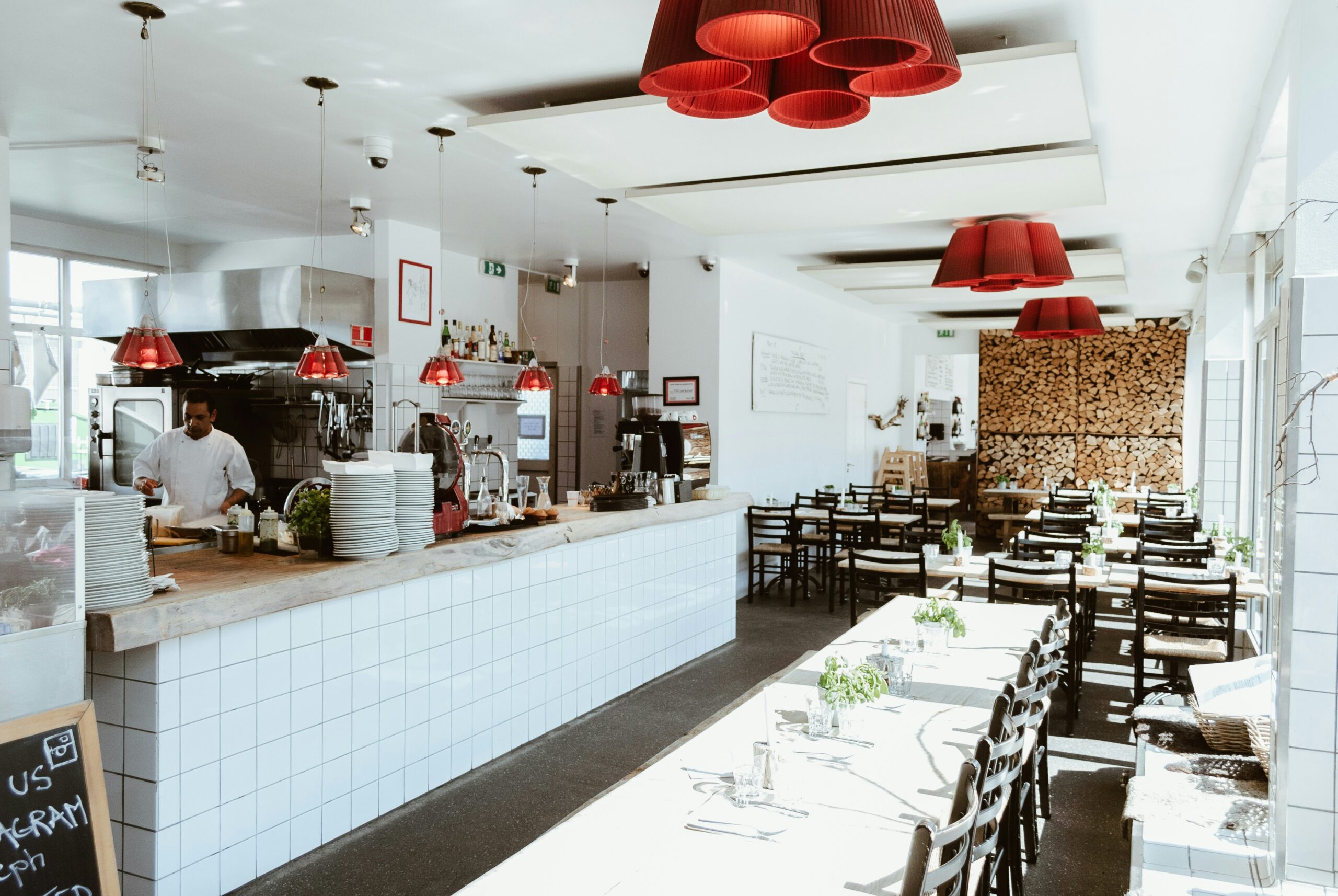“China!” the employee called. Supuck Prugsiganont looked up, shocked at the racial slur. A Thai national finishing her PhD in Denmark, Prugsiganont and her friends had stopped for a quick bite at the Burger King in Copenhagen Airport on the evening of October 21.
Prugsiganont would normally let this type of everyday racism slide, but this time she was a paying customer and the racial slur had come from an employee filling out her order.
My name isn’t “China”

“The staff wrote ‘China’ on the receipt and called out loud ‘China’ when our order was ready,” Prugsiganont said. “We decided to go up to the employee to bring attention to this kind of behavior.”
Instead of apologising, Prugsiganont said the employee laughed and said she and her boyfriend Pascal, a Dutch national, were wasting his time. Another customer intervened and requested the name of the employee and his manager – both of whom refused to oblige.
As the customer tried to take a photo of the manager’s name tag, the manager claimed this was harassment and called airport security. Four security personnel responded and de-escalated the situation. Still, Prugsiganont said the employee never admitted he did anything wrong.
“Security came, but they just said the employee didn’t do it deliberately, and they could see no harm in it. But I disagree. I think that casual racism is unacceptable in such an international place like the airport,” Prugsiganont said.
Ulrik Jönsson, a Swede travelling with his 11-year-old son, was behind Prugsiganont in the line and corroborated her story.
“When the Thai group objected to being called ‘China’ and said they found this offensive, they were ignored by the staff who just laughed and told them to go away and stop wasting their time. All in all, it was a very uncomfortable situation and strange behaviour,” Jönsson said.
Suraj Lakhani wrote on Burger King Danmark’s Facebook page that he also witnessed the incident. “Burger King staff acted in a horrible and aggressive manner!” Lakhani wrote.
Hygge racism
While this incident falls far short of being racially-driven hate-speech, it’s square in the category of ‘everyday’ or ‘casual’ racism – an example of its very Danish variant: ‘hygge racism’.
According to Den Danske Ordbog, ‘hygge racism’ refers to “using racist words and expressing prejudice about individuals of another ethnic origin in a way that you think is fun and unproblematic, but which is hurtful and offensive to those you talk about or talk to”.
Hygge racism consists of everyday, casual micro-aggressions that eventually add up to racism in its most recognisable and extreme forms. The speaker may not always intend the remarks to be malicious, but they are often perceived as such.
Slurs not just for expats
Prugsiganont’s experience, however, isn’t an isolated one. Sin Li, a Dane of Vietnamese descent, experiences casual racism on a daily basis.
In fact, Li said his grandmother was pushed down a flight of stairs a few years ago by some teenagers shouting racial slurs, which required her to undergo surgery to treat internal bleeding in her brain.
The worst part, Li said, is that hygge racism isn’t reserved for strangers. Even his friends pull back the corner of their eyes to make ‘Asian eyes’ or use high-pitched noises to imitate Asian accents.
“They don’t even know it is racist. When growing up, they were ingrained with the idea that it is okay to make fun of Asians and Asian languages,” Li said.
Minority voices silenced
Even as Black Lives Matter and similar movements gain global traction, Asian voices are often missing from the conversation surrounding everyday racism.
Part of this, Prugsiganont speculates, is due to the Asian nature of being more reserved. Another part, she said, is that these complaints are often not taken seriously.
“Usually I just complain to my friends, because I don’t know where else to say this. Most of the time, people would just tell me to ignore it. But this time, it’s quite serious because the racism came from Burger King staff,” Prugsiganont said.
Li agrees, adding that not only do Asians tend to not speak up, but that the Danish culture of minding your own business potentially represses dissenting minority voices.
Much ado about nothing?
In the climate of PC culture and the #MeToo movement, it may be tempting to say the situation surrounding everyday racist remarks is overblown and just creates a ‘culture of victimhood’.
For instance, a shift leader at the Copenhagen Airport Burger King pointed out that their staff are very international and that any remarks could not have been ill-intentioned.
However, while everyday racism may seem harmless, it’s not unproblematic.
ver time, these micro-aggressions become accepted as the norm and slowly enforce a systematic view that oppresses certain individuals, according to Ditte Marie Munch-Jurisic, a post-doc student researching unconscious bias at Roskilde University.
“When a person who experiences hygge racism does not protest among their group of friends, and laughs with them, it may be because the individual cannot be bothered to have the tough talk about it,” she said.
“The author of the joke therefore believes that everything is fine, even though in reality it may have done harm.”
While Li’s friends and acquaintances might think nothing of their hygge racist remarks, Li knows only too well that the daily interactions eventually add up.
“People can say that you don’t have to care about what other people think,” said Li.
“But in the end, it does make a difference. You feel low priority. Why do I have to fight my way up all the time to get approved or to get heard? It makes me care less about what is happening in society.”
Making amends
When Burger King Denmark was reached for comment, Daniel Schröder, its marketing director, was quick to condemn the behaviour.
“The behaviour we’re hearing about is completely unacceptable and against all rules and regulations for good customer service at Burger King,” he said.
Everyone must be treated with respect at our restaurants. We invite every guest to our Burger King restaurants and we are truly sorry for this incident. We’re investigating the incident fully and will strongly emphasise our rules and regulations to our staff.”
Burger King Denmark is trying to make strides in the right direction, but it remains to be seen if this is enough. The incident follows on the heels of other related gaffes from the fast-food chain this year.
Notably, Burger King New Zealand recently released an ad depicting diners using oversized red chopsticks to eat their new Vietnamese Sweet Chili Tendercrisp burger in April and a US-based location refused service to a deaf woman in August. After the August incident, a Burger King representative said all employees at that location will undergo sensitivity training.
“All I want is Burger King to take this situation seriously so it won’t happen to other customers, as this can ruin their business in the long run,” concluded Prugsiganont.
















